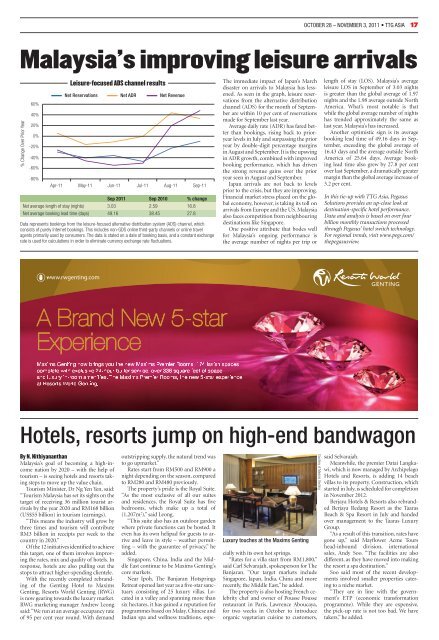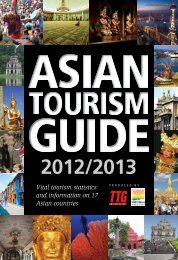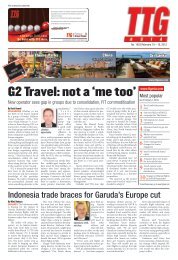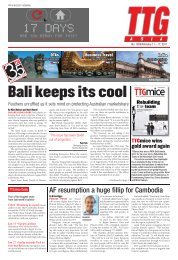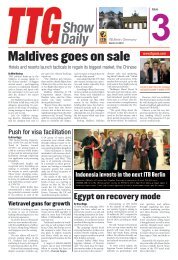Thailand takes a hit - TTG Asia
Thailand takes a hit - TTG Asia
Thailand takes a hit - TTG Asia
- TAGS
- thailand
- takes
- ttgasia.com
Create successful ePaper yourself
Turn your PDF publications into a flip-book with our unique Google optimized e-Paper software.
OctOber 28 – NOvember 3, 2011 • ttg asia 17<br />
Malaysia’s improving leisure arrivals<br />
% Change Over Prior Year<br />
60%<br />
40%<br />
20%<br />
0%<br />
-20%<br />
-40%<br />
-60%<br />
-80%<br />
Leisure-focused ADS channel results<br />
Net Reservations Net ADR Net Revenue<br />
Apr-11 May-11 Jun-11 Jul-11 Aug-11 Sep-11<br />
Sep 2011 Sep 2010 % change<br />
Net average length of stay (nights) 3.03 2.59 16.8<br />
Net average booking lead time (days) 49.16 38.45 27.8<br />
Data represents bookings from the leisure-focused alternative distribution system (ADS) channel, which<br />
consists of purely Internet bookings. This includes non-GDS online third-party channels or online travel<br />
agents primarily used by consumers. The data is stated on a date of booking basis, and a constant exchange<br />
rate is used for calculations in order to eliminate currency exchange rate fluctuations.<br />
The immediate impact of Japan’s March<br />
disaster on arrivals to Malaysia has lessened.<br />
As seen in the graph, leisure reservations<br />
from the alternative distribution<br />
channel (ADS) for the month of September<br />
are within 10 per cent of reservations<br />
made for September last year.<br />
Average daily rate (ADR) has fared better<br />
than bookings, rising back to prioryear<br />
levels in July and surpassing the prior<br />
year by double-digit percentage margins<br />
in August and September. It is the upswing<br />
in ADR growth, combined with improved<br />
booking performance, which has driven<br />
the strong revenue gains over the prior<br />
year seen in August and September.<br />
Japan arrivals are not back to levels<br />
prior to the crisis, but they are improving.<br />
Financial market stress placed on the global<br />
economy, however, is taking its toll on<br />
arrivals from Europe and the US. Malaysia<br />
also faces competition from neighbouring<br />
destinations like Singapore.<br />
One positive attribute that bodes well<br />
for Malaysia’s ongoing performance is<br />
the average number of nights per trip or<br />
length of stay (LOS). Malaysia’s average<br />
leisure LOS in September of 3.03 nights<br />
is greater than the global average of 1.97<br />
nights and the 1.98 average outside North<br />
America. What’s most notable is that<br />
while the global average number of nights<br />
has trended approximately the same as<br />
last year, Malaysia’s has increased.<br />
Another optimistic sign is its average<br />
booking lead time of 49.16 days in September,<br />
exceeding the global average of<br />
16.43 days and the average outside North<br />
America of 25.64 days. Average booking<br />
lead time also grew by 27.8 per cent<br />
over last September, a dramatically greater<br />
margin than the global average increase of<br />
3.2 per cent.<br />
In this tie-up with <strong>TTG</strong> <strong>Asia</strong>, Pegasus<br />
Solutions provides an up-close look at<br />
destination-specific hotel performance.<br />
Data and analysis is based on over four<br />
billion monthly transactions processed<br />
through Pegasus’ hotel switch technology.<br />
For regional trends, visit www.pegs.com/<br />
thepegasusview.<br />
P17 RW Genting_SA ok.indd 1 24/10/11 9:13 AM<br />
Hotels, resorts jump on high-end bandwagon<br />
By N. Nithiyananthan<br />
Malaysia’s goal of becoming a high-income<br />
nation by 2020 – with the help of<br />
tourism – is seeing hotels and resorts taking<br />
steps to move up the value chain.<br />
Tourism Minister, Dr Ng Yen Yen, said:<br />
“Tourism Malaysia has set its sights on the<br />
target of receiving 36 million tourist arrivals<br />
by the year 2020 and RM168 billion<br />
(US$55 billion) in tourism (earnings).<br />
“This means the industry will grow by<br />
three times and tourism will contribute<br />
RM3 billion in receipts per week to the<br />
country in 2020.”<br />
Of the 12 initiatives identified to achieve<br />
this target, one of them involves improving<br />
the rates, mix and quality of hotels. In<br />
response, hotels are also pulling out the<br />
stops to attract higher-spending clientele.<br />
With the recently completed rebranding<br />
of the Genting Hotel to Maxims<br />
Genting, Resorts World Genting (RWG)<br />
is now gearing towards the luxury market.<br />
RWG marketing manager Andrew Leong<br />
said: “We run at an average occupancy rate<br />
of 95 per cent year round. With demand<br />
outstripping supply, the natural trend was<br />
to go upmarket.”<br />
Rates start from RM500 and RM900 a<br />
night depending on the season, compared<br />
to RM280 and RM480 previously.<br />
The property’s pride is the Royal Suite.<br />
“As the most exclusive of all our suites<br />
and residences, the Royal Suite has five<br />
bedrooms, which make up a total of<br />
(1,207m 2 ),” said Leong.<br />
“This suite also has an outdoor garden<br />
where private functions can be hosted. It<br />
even has its own helipad for guests to arrive<br />
and leave in style – weather permitting<br />
– with the guarantee of privacy,” he<br />
added.<br />
Singapore, China, India and the Middle<br />
East continue to be Maxims Genting’s<br />
core markets.<br />
Near Ipoh, The Banjaran Hotsprings<br />
Retreat opened last year as a five-star sanctuary<br />
consisting of 25 luxury villas. Located<br />
in a valley and spanning more than<br />
six hectares, it has gained a reputation for<br />
programmes based on Malay, Chinese and<br />
Indian spa and wellness traditions, espe-<br />
Luxury touches at the Maxims Genting<br />
cially with its own hot springs.<br />
“Rates for a villa start from RM1,800,”<br />
said Carl Selvarajah, spokesperson for The<br />
Banjaran. “Our target markets include<br />
Singapore, Japan, India, China and more<br />
recently, the Middle East,” he added.<br />
The property is also hosting French celebrity<br />
chef and owner of Pousse Pousse<br />
restaurant in Paris, Lawrence Aboucaya,<br />
for two weeks in October to introduce<br />
organic vegetarian cuisine to customers,<br />
Courtesy of Maxims Genting<br />
said Selvarajah.<br />
Meanwhile, the premier Datai Langkawi,<br />
which is now managed by Archipelago<br />
Hotels and Resorts, is adding 14 beach<br />
villas to its property. Construction, which<br />
started in July, is scheduled for completion<br />
in November 2012.<br />
Berjaya Hotels & Resorts also rebranded<br />
Berjaya Redang Resort as the Taaras<br />
Beach & Spa Resort in July and handed<br />
over management to the Taaras Luxury<br />
Group.<br />
“As a result of this transition, rates have<br />
gone up,” said Mayflower Acme Tours<br />
head-inbound division, international<br />
sales, Andy Soo. “The facilities are also<br />
different, as they have moved into making<br />
the resort a spa destination.”<br />
Soo said most of the recent developments<br />
involved smaller properties catering<br />
to a niche market.<br />
“They are in line with the government’s<br />
ETP (economic transformation<br />
programme). While they are expensive,<br />
the pick-up rate is not too bad. We have<br />
takers,” he added.


